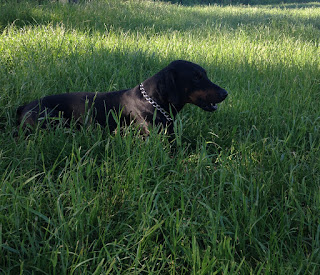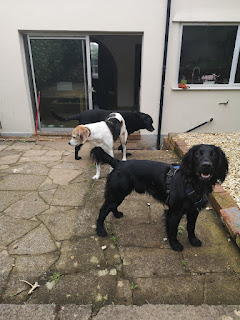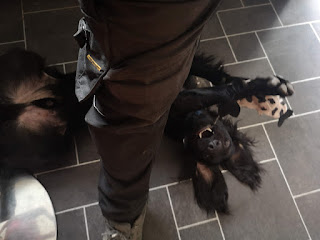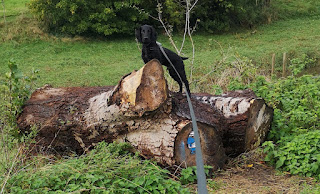Barking Bliss: Find Out If You're Ready to
Em-bark on a Furry Adventure
Q: How do I know if I'm ready to get a dog?
A:. If you're thinking about getting a dog, it's important to know that it's a big responsibility. I have always had dogs in my life. It’s a life filled with wagging tails, wet noses and endless affection, and I wouldn’t have it any other way, but they require time, patience, and resources. Before you bring a dog into your home, ask yourself if you're ready for the commitment. Do you have the time and energy to provide daily exercise, training, and attention to your furry friend? Can you afford the regular vet visits and other expenses that come with dog ownership? It's important to consider all these factors to ensure that you can give your dog the love and care they deserve.
If you're not sure if you're ready, there are many ways to test the waters. You could volunteer at a local animal rescue centre or foster a dog to get a better sense of what it's like to care for a dog. By taking these steps, you can make an informed decision about whether getting a dog is right for you and your lifestyle.
Q: What breed of dog is best for me?
A: Choosing the right breed of dog can be a daunting task, but with a little research, you can find the perfect furry companion to fit your lifestyle. Most importantly, when considering getting a dog, it's crucial to think about your own needs and preferences. Are you an active person who loves spending time outdoors, or do you prefer a more relaxed lifestyle? Do you have a big garden for your pup to play in, or do you live in a flat with limited space? All of these factors can help you determine which breed is best for you. It's also important to consider any allergies or sensitivities you may have to certain breeds.
Don't be afraid to reach out to other dog owners, local vets and reputable breeders to learn more about different breeds and what to expect. They can offer valuable insights into the temperament, exercise requirements, and grooming needs of different breeds.
Ultimately, the best breed of dog for you is one that matches your personality, lifestyle, and living situation. By doing your research and taking the time to find the right fit, you can enjoy a lifetime of love and companionship with your furry friend.
Q: Should I get a puppy or an adult dog?
A: Deciding whether to get a puppy or an adult dog is a big decision, and there are pros and cons to both options. As a dog lover myself, I understand the appeal of a cute and cuddly puppy, but it's important to consider your lifestyle and preferences when making this decision.
I too faced the same dilemma when deciding to get a dog. After weighing the pros and cons, I chose to go with a puppy since we have grandchildren, and I wanted to train our pup while keeping children in mind. Perhaps, when the grandchildren are older, we can add a rescue dog to our family mix. Ultimately, the decision of whether to get a puppy or an adult dog is entirely personal and depends on what you have in your life at the time and in the foreseeable future.
Puppies require a lot of attention and training, as they are still learning how to behave in the world. They also require a lot of time and patience to socialise and teach good habits. However, they can be a great choice if you have a lot of time and energy to devote to them and want to be involved in every aspect of their upbringing. On the other hand, adult dogs may already be trained and socialised, and they may be less demanding than a puppy. They also tend to have a more established personality, so you can get a good sense of what you're getting into. However, they may also come with some unknown history or baggage that requires additional work to correct.
Ultimately, the decision of whether to get a puppy or an adult dog should be based on your own lifestyle, preferences, and priorities. Consider factors like your schedule, energy level, and desired level of involvement with your dog, and talk to your local vet or a reputable breeder to help you make an informed decision. With the right preparation and guidance, you can find the perfect furry companion to bring love and joy to your life.
Q: How can I prepare my home for a new dog?
A: Bringing
a new furry friend home is an exciting time, but it's important to make sure
your home is ready for them before their arrival.
Having always had dogs, I know that safety and security are top priorities. One of the first things you should do is remove any hazardous items that could be harmful to your dog, such as chemicals, sharp objects, or poisonous plants. It's also a good idea to provide a designated space for your dog, such as a cozy crate or comfy bed, and make sure they have plenty of toys and chews to keep them entertained. I love to spoil my dog with lots of different toys, from puzzle toys to squeaky toys, to keep him engaged and mentally stimulated.
Establishing a routine for exercise, training, and other daily activities is also important to help your dog feel settled and comfortable in their new home. This can include regular walks or trips to the park, training sessions, and playtime. Additionally, you may want to consider puppy-proofing your home, especially if you're bringing home a curious and adventurous puppy. This can include securing loose cords, covering electrical outlets, and using baby gates to restrict access to certain areas of your home. By taking these steps to prepare your home, you can create a safe and welcoming environment for your new furry friend.
Q: What should I do if I'm having
trouble training my dog?
A: I understand how frustrating it can be when you're having trouble training your dog. But don't worry; with a little patience and persistence, you'll get there! As a fellow dog lover, I know firsthand that sometimes we need a little extra help to get the job done. That's why I recommend considering working with a professional dog trainer, attending a training class to get the support and guidance you need also checking your social media sites for visual demonstrations. These experts can offer personalized advice and techniques to help you and your dog work through any training issues you may be facing.
Remember, positive reinforcement and reward-based training methods are much more effective than punishment-based methods. So, focus on building a strong bond with your dog through positive interactions and training exercises. Celebrate their successes and be patient when things don't go as planned. After all, training takes time and effort, but the rewards of a well-trained dog are well worth it. Keep up the good work!







Comments
Post a Comment